Table 1.
Tyrosine kinase inhibitors under phase II/III clinical studies for HCC treatment [4].
| Drug | Targets | Descriptions | Reference |
|---|---|---|---|
Cediranib 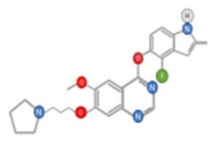
|
VEGFR | Shows high toxicity and is ineffective for patients with unresectable or metastatic HCC | [30] |
Dovitinib 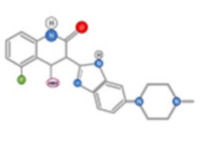
|
c-KIT, Flt-3, FGFR, VEGFR |
Significantly prolongs survival and inhibits primary tumour growth and lung metastasis in HCC xenograft models | [31,32] |
Erlotinib 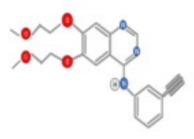
|
EGFR | Shows modest prolonged progression-free survival and overall survival in patients with unresectable HCC | [33,34] |
Gefitinib 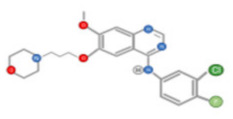
|
EGFR | Inhibits the tumor growth of HCC xenografts in a mouse model | [35] |
Selumetinib 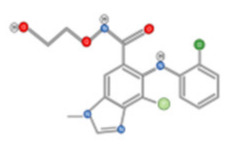
|
MEK1 | Suppresses tumour growth of HCC xenografts in mouse model Shows inadequate antitumour activity with short progression-free survival in patients with locally advanced or metastatic HCC |
[36,37] |
Brivanib 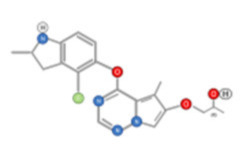
|
FGFR, VEGFR | Increases apoptosis, reduces microvessel density, and decreases VEGFR phosphorylation Shows promising antitumour activity in patients with advanced HCC |
[28,29] |
Linifanib 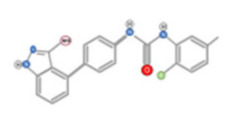
|
PDGFR, VEGFR | Inhibits tumour growth of HCC xenografts in the mouse model Shows similar overall survival to sorafenib in patients with advanced HCC | [38,39,40] |
Sunitinib 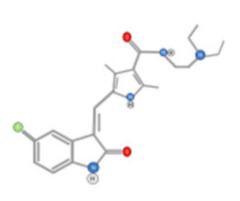
|
c-Kit, Flt-3, PDGFP, VEGFR |
Increases apoptosis and reduces microvessel density of HCC xenografts Displays poor overall survival in patients with advanced HCC and has severe toxicity |
[41] |
Orantinib 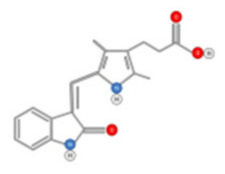
|
FGFR, PDGFR, VEGFR | Suppresses the tumour growth of subcutaneously co-injected HCC cell line xenografts Shows no improvement in overall survival in patients with unresectable HCC |
[42,43] |
| Bevacizumab | VEGF | Inhibits tumour growth of HCC cell lines or patient-derived HCC xenografts | [44,45] |
| Cetuximab | EGFR | Shows no obvious response in patients with advanced HCC | [46] |
VEGF: Vascular endothelial growth factor; VEGFR: Vascular endothelial growth factor receptor; FGFR: Fibroblast growth factor receptor; EGFR: Epidermal growth factor receptor; MEK1: Mitogen-activated protein kinase (MAPK) kinase; PDGFR: Platelet-derived growth factor receptor; Flt-3: FMS-like tyrosine kinase-3.
